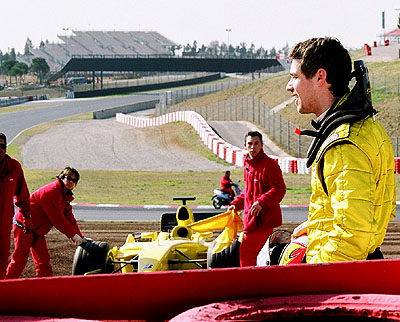


17/05/2005
NEWS STORY
 |
Following our news article in which we reported that Scottish veteran David Coulthard is concerned at the level of safety at F1 test sessions, Pitpass has been contacted by Susan Morris, General Manager of Safetrack Fire and Medical Ltd, a company run by a number of long-serving marshals, which voiced similar fears to both the teams and the FIA back in 2000:
"It is with interest that I read your report regarding David Coulthard's concerns about safety at F1 private test sessions. He said "all my biggest accidents have happened in testing" and "revealed that some tracks were staffed by a lone (unpaid) marshal on each corner, equipped with a fire extinguisher." (Note: marshals are generally unpaid.)
In 1999 and 2000, following a number of major test session incidents, three very experienced marshals, John Jefferys (JJ), Andy Malins and Clive Harper, became very concerned about the level of fire, rescue and medical services provided at such sessions.
Although Formula One cars are driven at racing speeds during test sessions, and the same types of accidents occur as happen in races, the trackside safety provision at test sessions is considerably less than that found at circuits on race days.
Improved design of Formula One cars has led to a much safer sport but accidents still happen and the type of injury can still be serious and life threatening.
At the races there are several well-trained marshals, but at mid week testing sessions there are only a few personnel present, mostly consisting of off duty local ambulance or fire and rescue personnel. They are skilled in their own job but not necessarily in dealing with racing incidents and extricating a driver without causing more harm than the driver has already sustained.
In many cases they are not dressed appropriately to deal with a car on fire whereas fire marshals on race day wear fire protective clothing, which enables them to get close to the fire. In addition, the trained rescue crews with cutting gear are not available.
In addition to safety, there are legal and moral issues to be considered. Teams budget for replacement cars. They cannot budget for the life of a driver. Current health and safety legislation requires that risks are assessed and that provision is made to deal with reasonably foreseeable incidents.
If it comes to litigation the test organisers, circuits and teams could be held responsible for negligent failure to provide adequate fire, safety and rescue services.
Such were the concerns of JJ, Andy and Clive that they formed a company with the express purpose of providing a professional safety service at F1 test sessions in Britain and Europe.
On 31 October 2000 they made a presentation to the FIA Research Group in Paris, in the presence of Professor Sid Watkins, Chief Medical Delegate, and Charlie Whiting, FIA Formula One Race Director and Safety Delegate. They hoped that the FIA would support the venture, which they expected to be funded both by contributions from the teams and circuits and by sponsorship.
Whilst the presentation was well received, and both Professor Watkins and Charlie Whiting wished them well with the project, they felt that it was up to JJ, Andy and Clive to make contact with the teams and circuits rather than have the FIA take a lead in the matter.
JJ had already written to all of the teams in 1999 but received replies only from Ferrari, McLaren, Stewart and Williams. All were supportive of the idea but felt that it was either an FIA issue or the responsibility of the circuits.
The difficulty of getting all the teams involved, together with the test circuits appeared insurmountable, especially when a second tyre manufacturer entered F1 and the overall number of test sessions increased. Then, following 9/11, marketing budgets and sponsorship dried up and, reluctantly, the project was shelved.
That David Coulthard is having to voice his concerns five years after we attempted to rectify the situation is shameful.
With support from the Grand Prix Drivers Association (GPDA), the teams, circuits, and tyre manufacturers, JJ, Andy, Clive and I believe that safety at test sessions can be improved. It must be, before a driver is seriously injured or killed through lack of an adequate fire, safety and rescue service."
Susan Morris
General Manager
Safetrack Fire and Medical Ltd